The Importance of Keywords in Content Creation
While many SEOs are switching from a keyword-focused approach to a more topical approach, keywords still play a crucial role in SEO. By strategically incorporating relevant keywords into your content, it becomes easier for search engines to understand what a page is about.
Keywords are considered by some the backbone of SEO and content creation, serving as the key to unlocking visibility on search engines. In this blog, we’ll equip you with the knowledge and tools necessary to navigate the intricate nuance of focus keywords. You’ll learn exactly what they are, how to find them using popular keyword research tools and go over key concepts from the Google Warehouse leak.
What is a focus keyword, anyway?
A focus keyword in SEO refers to a specific term or phrase that summarises the main topic or theme of a page. It is the singular keyword that you want a particular page to rank for in search engine results.
By honing on-page SEO elements around a focus keyword, you signal to search engines what the primary subject of your content is, making it easier for them to understand, index and rank your page accordingly. Not only will your page rank better for your focus keyword, but also keyword variations and related terms.
Focus keywords act as a strategic element in on-page optimization, helping to improve the visibility and relevance of a webpage in search engine rankings.
If you’re using Yoast SEO for WordPress, they have a field called focus keyphrase where you can input your focus keyword (not necessarily a single word). Yoast will analyse your on-page SEO elements and give you suggestions for further optimization.
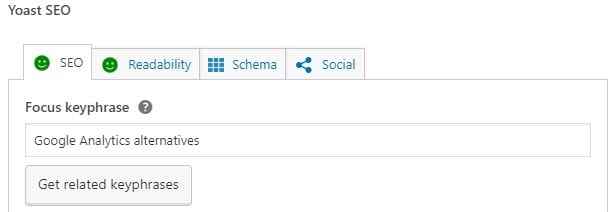
Focus Keywords vs Long Tail Keywords
Focus keywords and long tail keywords serve different purposes in SEO, but will sometimes have overlap.
A focus keyword is a specific term or phrase that encapsulates the main topic of a page, while long tail keywords are longer, more specific phrases that target niche audiences and typically have lower search volume but higher conversion rates.
For example, if you were writing a blog about SaaS demand generation, your focus keyword would likely just be “SaaS demand generation”. Long tail keywords related to the focus keyword of this page might be “demand generation vs lead generation” or “how to build brand awareness for SaaS companies”.
While focus keywords are powerful for indicating the main content of a webpage to search engines, long tail keywords are valuable for targeting specific, often more qualified, search traffic.
Focus keywords are broad and competitive, focusing on the main theme of a page, whereas long tail keywords are more detailed and specific, catering to niche audiences.
How to Research Focus Keywords
Ahrefs Keywords Explorer
The most basic, but one of the most effective ways to find keywords you can produce pages for. The Ahrefs Keywords Explorer is simple: You type in a focus keyword and it gives you search suggestions for related keywords.
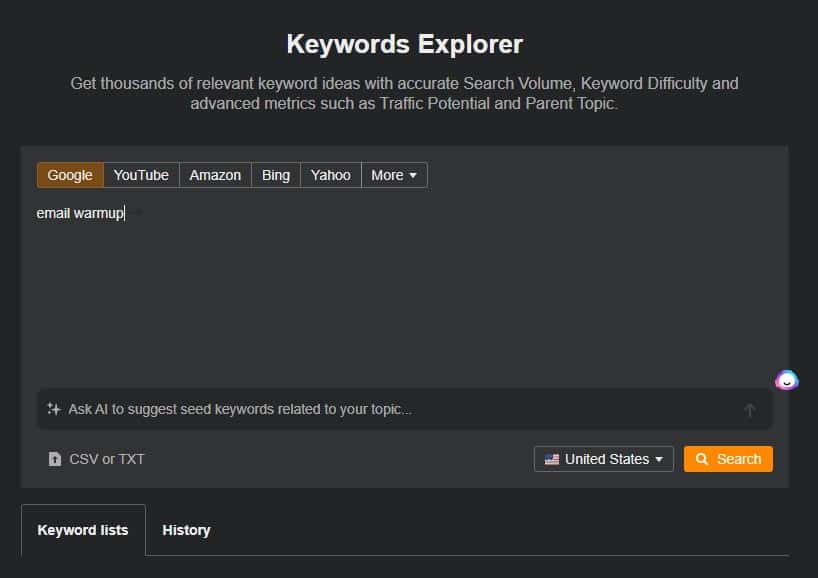
In this example, we’re on the hunt for keywords related to the phrase “email warmup”. We’ve highlighted a few key areas of the Keywords Explorer that we use on the regular: Matching terms, Search suggestions and Questions. It’s all pretty straightforward, you can do the rest from here without any training.
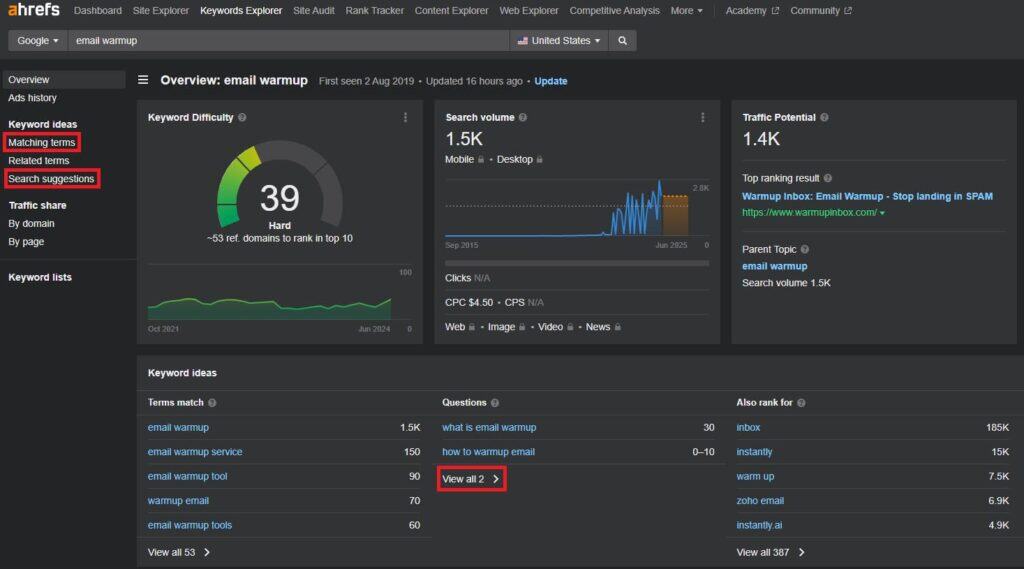
LowFruits for Low Competition Focus Keywords
LowFruits is an underrated keyword research tool that analyses the SERPs for you and finds low competition focus keywords you can rank for with minimal backlink building.
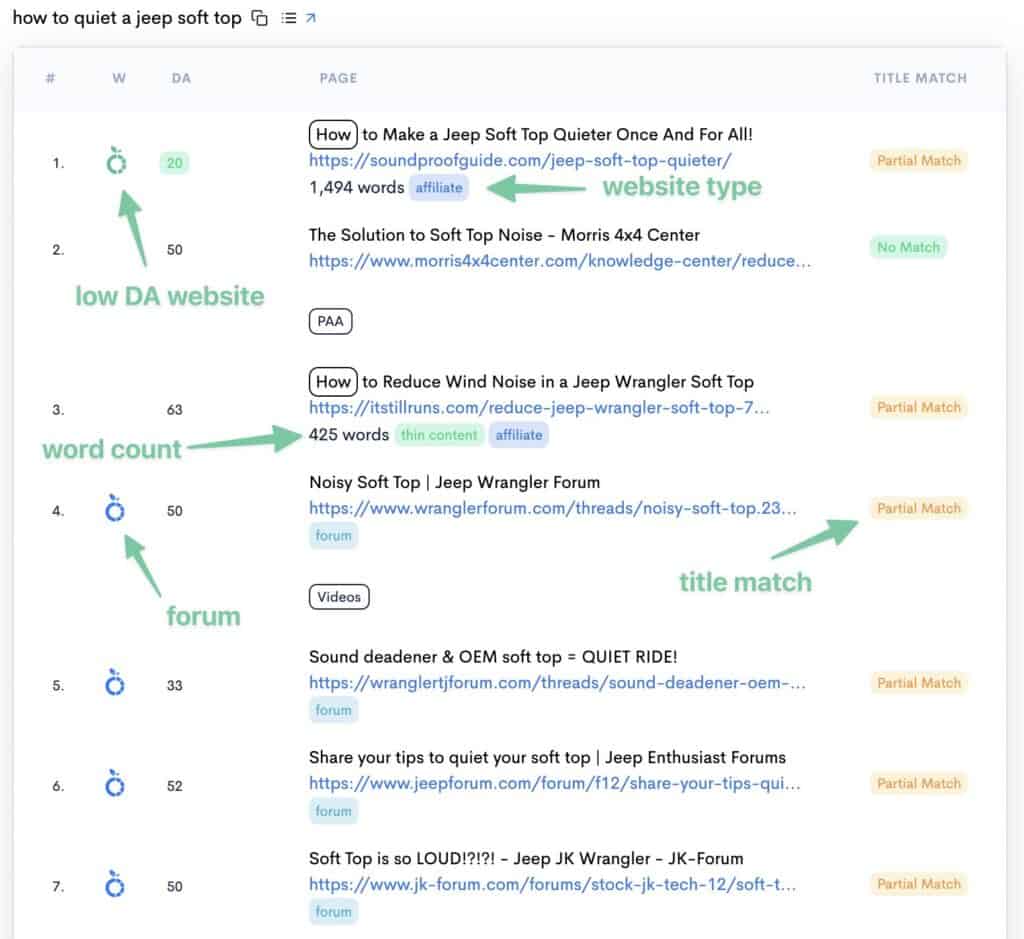
Image source: LowFruits.io
Competitor Analysis
Ahrefs’ Site Explorer is our go-to tool for competitor analysis. Type in any domain you want to analyse and Ahrefs will give you practical data you can play with. In this example, we’re going to take a look under the hood of Triple Whale.

Everything under “Organic search” on the left sidebar is incredibly useful for keyword research, but we’re going to pay special attention to the Top pages report.
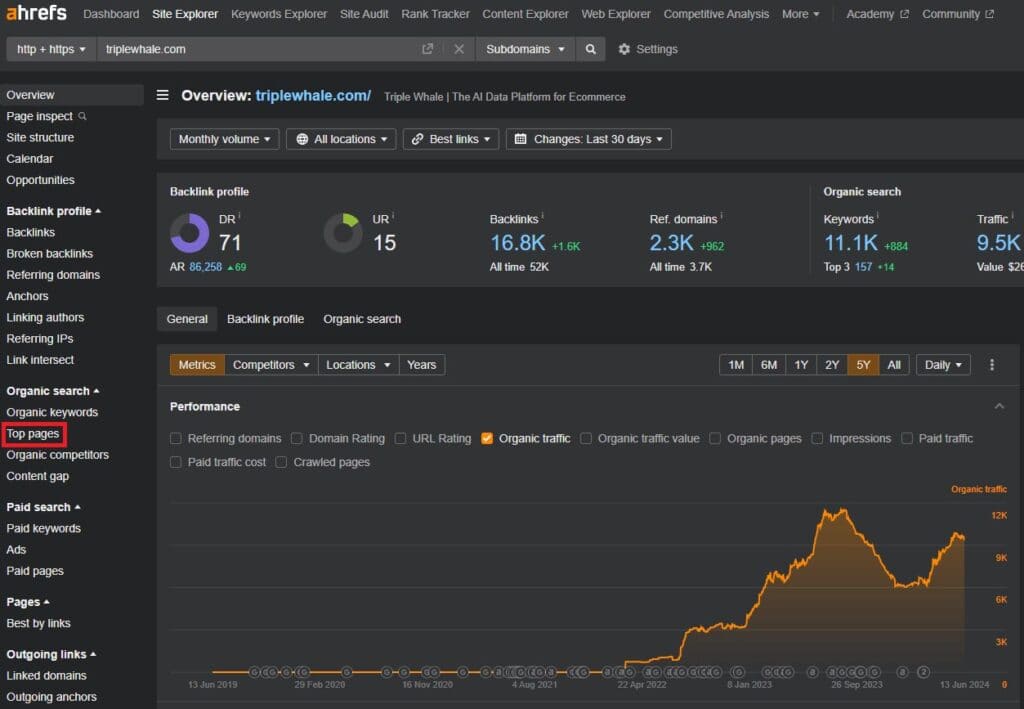
This report is the bread and butter of competitor analysis. The Top keyword is the focus keyword of the page, the keyword that is actually bringing in the most traffic to that particular page.
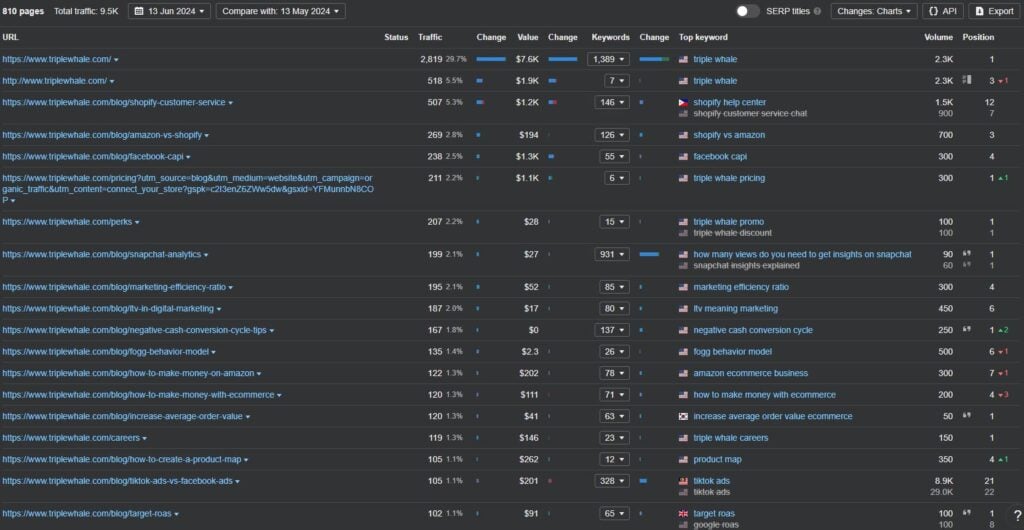
In this case, we’ll probably want to avoid the branded keywords like “triple whale” and “triple whale pricing” because we’re looking for focus keywords that are relevant to our hypothetical competitor website. Instead, we would opt for non-branded keywords that are bringing in the bulk of their traffic like “marketing efficiency ratio.”
Evaluating Keyword Potential
Evaluating a keyword’s potential is crucial for maximising the effectiveness of SEO efforts. While many SEOs will simply focus on the lowest competition, highest search volume keywords, there are other things to consider here like its contextual relevance and search intent.
Search Volume and Competition
Search volume typically refers to the number of times a particular keyword or phrase is searched for on a monthly basis. By analysing monthly search volume, you can get an estimate of how much traffic you can drive to a page from organic search.
However, forecasting traffic based on search volume alone can be tricky because it doesn’t account for what % of clicks each website in the SERP receives. Ahrefs has a Traffic Potential estimation in the Keywords Explorer, which can be handy if you’re trying to forecast the total traffic from an SEO campaign.
Competition is called Keyword Difficulty in Ahrefs and is measured by the estimated total number of backlinks you’ll need to rank for a focus keyword. Checking competitors’ backlinks in-depth will allow you to get a more accurate assessment of how many links you’ll need to snag top positions.
Keyword Relevance
Ideally, keywords should hold contextual relevance in 2 ways:
- Domain-level relevance: It should make sense within the overall website theme.
- Topical relevance: It should make sense within the overall body of content.
In the recent Google algorithm leak, there was a parameter about topical borders which I found very interesting. The main concept here is that if a site writes about a topic outside of its normal scope, Google doesn’t trust it (as much).
What this means for on-page SEO is that if you’re writing too far from the existing body of work on your site, Google will find difficulty justifying its ranking. Expanding the scope of your website categories requires writing about tangentially related topics with internal links in a logical pattern that branches out from existing content.
The off-page SEO implications are that if your guest posts are too far from a site’s topical borders, it won’t pass (as much) link equity. Write about focus keywords that are similar to their recent content if you want stronger equity passed.
Choosing the Right Focus Keywords
Choosing the right focus keywords for blog content is important for improving visibility and relevance in SERPs. By selecting keywords that align closely with the topic and intent of the website and existing content, you can achieve stronger rankings.
Aligning Keywords with Content Goals
SEOs should align their keyword research with overall content marketing efforts so that organic search traffic helps achieve business goals. By ensuring that focus keywords resonate with a business’ more general targets, you’ll be able to guide traffic towards money pages and drive conversions that move the needle.
Balancing Difficulty with Opportunity
Site Authority (SA) was revealed in the Google leak, an internal measurement Google uses to determine a website’s power in search engine results. It’s their version of DA or DR that has been theorised for years upon years, only to be confirmed recently.
What SA means for SEO is that websites with stronger backlink profiles will have an easier time ranking and maintaining rankings. Lower SA websites will have a more difficult time competing for rankings on keywords, which is why it’s important when selecting focus keywords to strike the right balance between keyword difficulty and SEO opportunity.
If the top positions for a focus keyword are being held by websites with high SA, it’s unlikely you can compete with them unless you yourself have a high SA or you put significant effort and resources into backlink building.
Optimise for Focus Keywords Today
Continuous keyword research and optimization are crucial in the constantly moving landscape of search intent and search rankings. By consistently analysing search trends and updating your keyword strategy, you can stay ahead of the competition.
Experimenting with various keywords and strategies is key to finding the perfect match for your content. By testing different options, you can uncover valuable insights into what resonates most with your target audience. Don’t be afraid to explore new approaches to optimise your content and stay ahead of the competition!
If you want a professional opinion, you can contact Spacebar Collective today to handle your keyword research and content production efforts. Let us help you stay ahead of your competition by optimising your content for focus keywords that make sense and implementing strategies that drive conversions.






